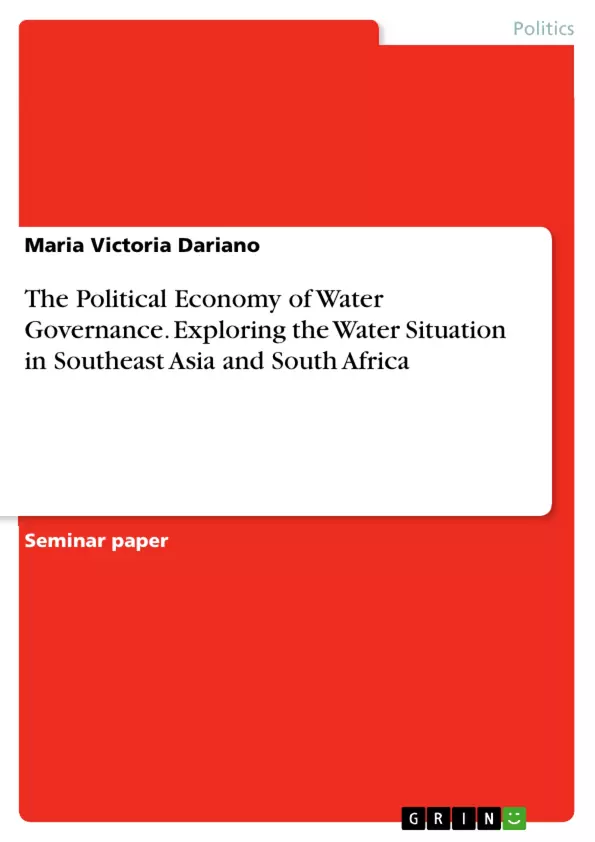Investing in water and sanitation access is creating improvements to livelihood, environmental health, and service provision. However, reports released by the United Nations Development Group on 17 January 2007 inform the public about the devastating situation of our water resources that is now affecting the entire population’s access to safe drinking water and sanitation.
The United Nations released a press statement exposing the fact that Asia is home to 71% of the total number of people in the world without access to improved sanitation and 58% of those without access to safe water (2005). As of 2002 based on the MDG target No. 10, the UNICEF reports that 4 out of 10 people in the world don't have access even to a simple latrine, 2 in 10 have no source of safe drinking water, and more than 3 million children die every year caused by waterborne diseases. (Witoelar)
Access to safe water is a fundamental human need and, therefore, a basic human right. This is the very nature why there is a need to revisit materials pertaining to the water governance of countries. This paper will focus on the political economy of water governance in Southeast Asia and South Africa.
Inhaltsverzeichnis (Table of Contents)
- I. Background
- II. Problematique
- III. The Politics of Water Governance: Addressing Legitimacy, Public Trust and Credibility
- A. Legitimacy and Transparency
- B. Public Trust and Accountability
- C. Credibility and Participatory Decision-Making
- IV. The Economics of Water Governance: Water as an Economic Good
- V. Southeast Asian Involvements
- VI. Water Governance in the Philippines
- Legal Framework of Water Privatization in the Philippines
- VII. Water Governance in South Africa
- VIII. Analysis
- IX. Recommendations
Zielsetzung und Themenschwerpunkte (Objectives and Key Themes)
This paper examines the political economy of water governance in Southeast Asia and South Africa, highlighting the challenges of ensuring equitable access to water resources while addressing issues of legitimacy, public trust, and credibility in water institutions. The paper investigates the impact of viewing water as an economic good and analyzes the implications for water policy and management.
- The importance of legitimacy, public trust, and credibility in water governance
- The role of transparency and accountability in fostering public support for water institutions
- The impact of viewing water as an economic good on water access and distribution
- The challenges of water governance in Southeast Asia and South Africa
- The need for participatory decision-making and inclusive approaches to water management
Zusammenfassung der Kapitel (Chapter Summaries)
- I. Background: This chapter introduces the global water crisis and highlights the need for improved water governance. It emphasizes the importance of water as a fundamental human right and underscores the challenges of ensuring equitable access to water resources.
- II. Problematique: This chapter explores the problem of unequal access to water resources and the role of water institutions in shaping water distribution. It examines the key concepts of legitimacy, public trust, and credibility and their significance in fostering public support for water institutions.
- III. The Politics of Water Governance: Addressing Legitimacy, Public Trust and Credibility: This chapter delves into the relationship between legitimacy, transparency, public trust, accountability, credibility, and participatory decision-making in water governance. It argues that effective water governance requires a strong foundation of public trust and confidence in water institutions.
- IV. The Economics of Water Governance: Water as an Economic Good: This chapter examines the economic arguments for viewing water as an economic good and the implications for water access and distribution. It discusses the challenges of balancing the economic value of water with its social and environmental significance.
- V. Southeast Asian Involvements: This chapter examines the water governance landscape in Southeast Asia, highlighting the unique challenges and opportunities in the region.
- VI. Water Governance in the Philippines: This chapter provides a detailed analysis of water governance in the Philippines, focusing on the legal framework of water privatization and its impact on water access and affordability.
- VII. Water Governance in South Africa: This chapter examines water governance in South Africa, highlighting the country's experience with water scarcity and the challenges of managing water resources in a context of inequality and historical injustices.
Schlüsselwörter (Keywords)
The key focus areas of this paper include water governance, political economy, legitimacy, public trust, credibility, transparency, accountability, participatory decision-making, water as an economic good, Southeast Asia, South Africa, water privatization, and equitable access to water resources.
Frequently Asked Questions
What are the primary challenges of water governance in Southeast Asia?
The primary challenges include ensuring equitable access to safe drinking water and sanitation, addressing the impacts of water privatization, and overcoming issues related to institutional legitimacy and public trust.
How does viewing water as an economic good affect its distribution?
Viewing water as an economic good often leads to a focus on market value, which can conflict with its social and environmental significance, potentially hindering access for the most vulnerable populations.
Why are legitimacy and public trust crucial for water institutions?
Legitimacy and public trust are essential for fostering public support and ensuring the effectiveness of water management policies, as they rely on transparency and accountability to be credible.
What is the focus of water governance in the Philippines?
In the Philippines, the focus is largely on the legal framework surrounding water privatization and how it impacts the affordability and accessibility of water resources for the citizens.
What specific water issues does South Africa face?
South Africa deals with severe water scarcity and the complex challenge of managing water resources within a historical context of inequality and social injustice.
- Quote paper
- Master of Arts in Social and Development Studies Maria Victoria Dariano (Author), 2016, The Political Economy of Water Governance. Exploring the Water Situation in Southeast Asia and South Africa, Munich, GRIN Verlag, https://www.grin.com/document/339078



